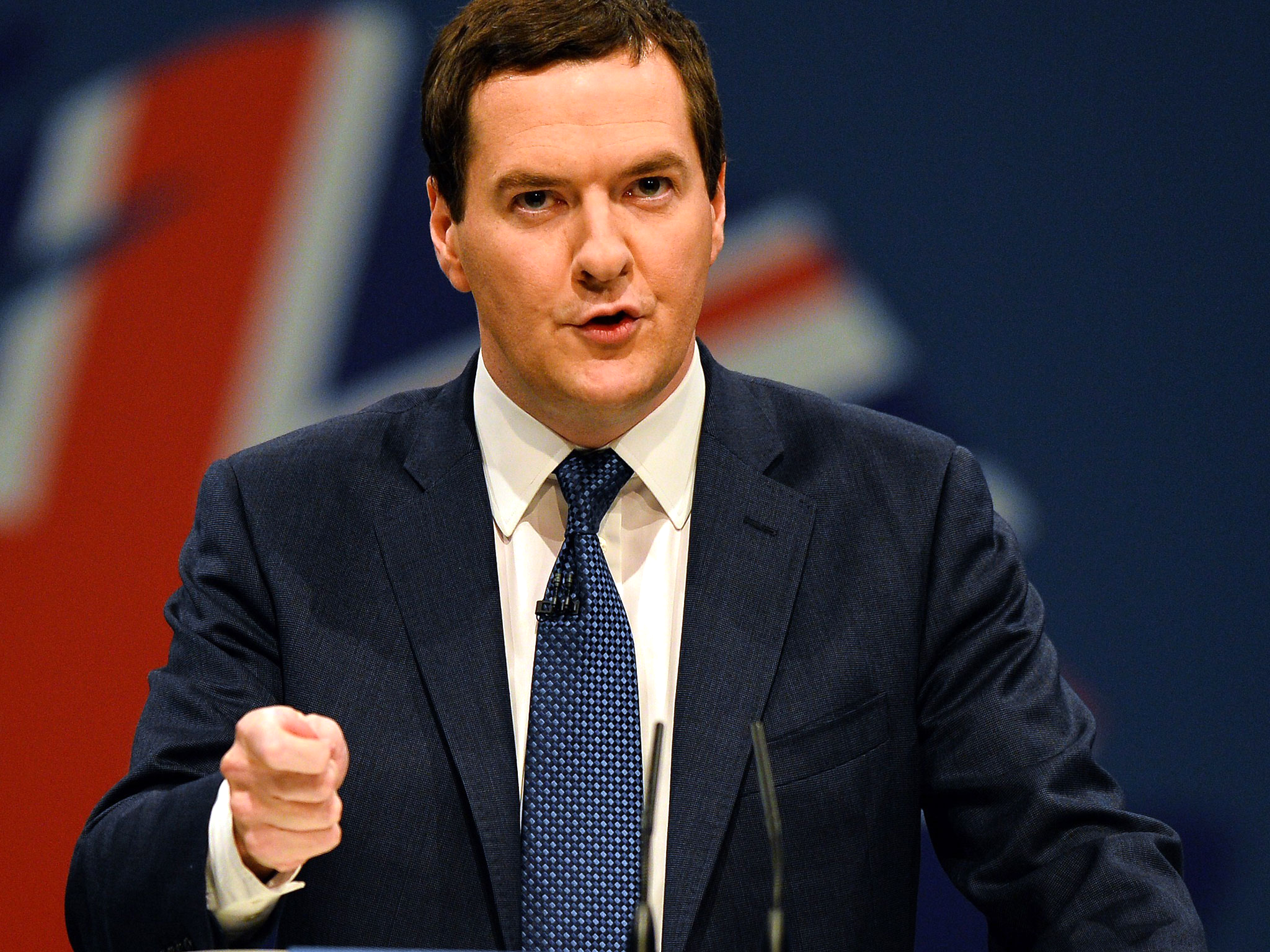Billions more to be cut from welfare cash before 2020 in Tory pledge for budget surplus
George Osborne said surplus would be 'insurance against difficult times ahead'

Your support helps us to tell the story
From reproductive rights to climate change to Big Tech, The Independent is on the ground when the story is developing. Whether it's investigating the financials of Elon Musk's pro-Trump PAC or producing our latest documentary, 'The A Word', which shines a light on the American women fighting for reproductive rights, we know how important it is to parse out the facts from the messaging.
At such a critical moment in US history, we need reporters on the ground. Your donation allows us to keep sending journalists to speak to both sides of the story.
The Independent is trusted by Americans across the entire political spectrum. And unlike many other quality news outlets, we choose not to lock Americans out of our reporting and analysis with paywalls. We believe quality journalism should be available to everyone, paid for by those who can afford it.
Your support makes all the difference.Public spending cuts which would shave billions of pounds off the welfare budget would continue until 2020 if the Conservatives win the 2015 election, George Osborne has revealed.
In his speech to the Conservative conference in Manchester, the Chancellor put clear blue water between his party and both Labour and the Liberal Democrats by announcing that the Tories would run a budget surplus in the next parliament rather than merely balance the nation's books.
Mr Osborne said the surplus would be an "insurance against difficult times ahead" to avoid repeating the Labour mistakes that resulted in a massive deficit. "This time we are going to fix the roof when the sun shines," he said.
The budget for infrastructure projects would be protected and Mr Osborne raised the prospect of tax cuts for working people while promising to avoid tax rises. But he admitted that would require a permanent squeeze on day-to-day spending by government departments.
With the health, schools and state pensions budgets safeguarded, Treasury sources admitted the £200bn-a-year bill for welfare and tax credits would be hit. A new "cap" could see benefits rise annually by less than inflation or the growth rate in the economy until 2020.
New fiscal rules to entrench the surplus will be announced next year and be included in the Tory manifesto. A Treasury source said: "We are not running away from the fact that this will require continued tough decisions, including on welfare."
The Liberal Democrats have blocked proposed curbs to housing benefit for under-25s and limiting welfare payments to two children per family, which would be back on the agenda if the Tories win a majority in 2015. The Lib Dems will not sign up to the tough new fiscal mandate. "This is Tory policy," said a Lib Dem source.
The Chancellor said: "The battle to turn Britain around is not even close to being over and we are going to finish what we started." But he struck an optimistic note, saying: "We rescued the economy together. We're going to recover together. And together, we're going to share in the rewards."
Mr Osborne argued that "people know the difference between a quick fix con and a credible economic argument" as he contrasted Labour's pledge to freeze energy prices with his announcement today that petrol duty will remain frozen until the 2015 election.
Provided he can find the necessary savings, he will scrap a rise of almost 2p a litre pencilled for September next year by the previous Labour Government. The move will cost £750m and Treasury officials say petrol will be 20p a litre cheaper by 2015 than under Labour's plans, claiming that motorists will be spared £22.6bn of taxes over the current five-year parliament.
The scale of the spending cuts by 2020 is not yet known but the new rules will be tougher than the Chancellor's existing "fiscal mandate". This compels the Government to be on course to run a structural surplus on the current budget five years ahead. "Structural" means adjusted for the economic cycle. A state with a cash deficit can still be in structural surplus if the economy is weak and tax revenues are thought likely to bounce back in future.
But the Chancellor's aides spoke today of running an "absolute" surplus within the next parliament, which seems to commit the Conservatives to accumulate a simple cash surplus between 2017 and 2020. The last time the Government ran such a surplus was in the late 1990s when the economy grew strongly and the then Labour Chancellor Gordon Brown stuck to the tight spending limits set by his Conservative predecessor.
Rachel Reeves, the shadow Chief Treasury Secretary, said: "Nobody will believe a word George Osborne says. His failure on growth means that far from balancing the books by 2015 as he promised, borrowing is now set to be £96bn. And for all the warm words about capital spending he is cutting it in 2015."
After Mr Osborne confirmed tougher benefit sanctions against the long-term jobless, Iain Duncan Smith, the Work and Pensions Secretary, will announce on Tuesday that some of the unemployed will be required to undertake "supervised job search activity" for 35 hours a week for up to six months. Failure to participate will lead to a loss of benefit.
Join our commenting forum
Join thought-provoking conversations, follow other Independent readers and see their replies
Comments